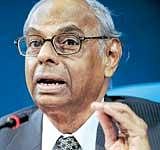
The RBI in the last review meet in June raised the repo rate by 25 basis points to 5.75 per cent and the reverse repo rate by 50 basis points to 4.5 per cent.
"I think the RBI will take a decision. But that depends on how inflation continues to behave in the next four weeks. Therefore, they will make some decision towards the end of the next month," Rangarajan told media persons on the sidelines of a lecture on 'Globalisation and the International Financial Crisis' at the University of Hyderabad.
He said if inflation persists at double-digit levels, action will probably be required.
Inflation in the food price index rose to an annual 9.53 per cent in the week ended July 24 as fruit and vegetables became cheaper. It was marginally higher at 9.67 per cent in the previous week.
The PMEAC Chairman, however, said the good monsoon may ease the inflationary levels.
"Our own projections say as a result of a good monsoon, the agriculture output will go up between 4 and 5 per cent this year and it will have a favourable affect on the availability of foodgrains. This will also dampen the inflationary expectations," Rangarajan said.He said the central bank is not hawkish and is doing what is appropriate to bring down inflation levels.
"We have inflation at uncomfortable high levels and (this) needs to be addressed. The RBI is taking the appropriate action. It is following a series of small steps rather than a big step. The RBI move is in the right direction," the economic adviser to the PM said.
He brushed aside the possibility of a super regulator being set up. Replying to a question on the super regulator issue, he said there is no question of a super regulator. The country has a system of multiple regulators and there is no unified single authority supervising the financial system, he asserted.
Earlier, in his speech, Rangarajan said the current account deficit may be of the order of 2.7 per cent of the GDP. The capital inflows are expected to be USD 73 billion this fiscal.
"This will go to cover the current account deficit and add USD 31 billion to our reserves. Thus, with a moderate surplus on the capital account after meeting the current account deficit, the exchange rate variations will stay within an acceptable range," he said.